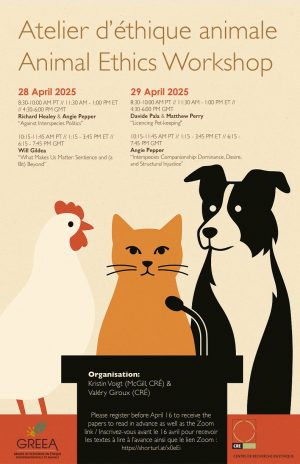
Le GRÉEA et le CRÉ accueilleront Jean-François Pradeau (Université de Lyon 3), qui nous offrira une présentation intitulée « Philosopher sans la viande. L’abstinence de la chair dans la tradition platonicienne ».
Président de séance: Louis-André Dorion.
Pour y participer via Zoom, c’est ici (ID de réunion: 812 5326 4221; code secret: 688603).

La deuxième édition du colloque annuel ULaval « L’agentivité dans tous ses états » se tiendra les 24 et 25 avril 2025, au Pavillon Laurentienne de l’Université Laval, à Québec, Canada.
Le colloque vise à rassembler des chercheurs travaillant sur les aspects théoriques de l’agentivité qui relèvent de champs de recherche tels que la philosophie de l’action, la philosophie des émotions, l’épistémologie, l’éthique normative, la philosophie politique, la science politique, et plus encore.
En plus des conférences d’honneur, huit créneaux sont réservés aux communications sélectionnées suite à un appel à contributions.
Cette année, les conférencier.ères d’honneur sont :
- Michael Bratman (Université Stanford)
- Agnes Callard (Université de Chicago)
- Jane Friedman (Université de New York)
- Alex Worsnip (Université Caroline du Nord à Chapel Hill)
Événement organisé par Artūrs Logins (Université Laval) et Catherine Rioux (Université Laval), en collaboration avec Nathan Howard (Université de Toronto). Le CRÉ est fier d’être associé à celui-ci.
L’activité est ouverte à tous et à toutes. L’entrée est gratuite, mais l’inscription est obligatoire. Pour vous inscrire, écrivez à l’adresse suivante avant le 18 avril 2025.
Pour plus de détails sur la programmation, c’est ici.
Le Groupe de recherche en éthique environnementale et animale (GRÉEA) et le Centre de recherche en éthique (CRÉ) organisent un atelier consacré à certains enjeux éthiques entourant les responsabilités morales des êtres humains envers les animaux non humains.
Programmation
28 Avril 2025
8h30-10h00 PT // 11h30 – 13h00 ET // 14h30-16h00 GMT
Richard Healey & Angie Pepper, “Against Interspecies Politics”
10h15-11h45 PT // 13h15 – 14h45 ET // 16h15 – 17h45 GMT
Will Gildea, “What Makes Us Matter: Sentience and (a Bit) Beyond”
29 Avril 2025
8h30-10h00 PT // 11h30 – 13h00 ET // 14h30-16h00 GMT
Davide Pala & Matthew Perry, “Licencing Pet-keeping »
10h15-11h45 PT // 13h15 – 14h45 ET // 16h15 – 17h45 GMT
Angie Pepper, “Interspecies Companionship: Dominance, Desire, and Structural Injustice”
Pour vous inscrire, recevoir les textes à lire à l’avance de même que le lien zoom, faites-le ici avant le 16 avril.
Organisation et animation: Kristin Voigt & Valéry Giroux


Ce colloque académique de deux jours vise à explorer les questions liées au mélange des modes de vie et des identités – ou le métissage – et au large éventails des perspectives et des considérations politiques qui se rapportent à ce sujet, comme développées dans plusieurs contextes coloniaux.
L’inscription est gratuite et fortement recommandée. Pour plus d’information et pour vous inscrire, cliquez ici.
Organisateur.rice.s:
Yann Allard-Tremblay (Science politique, Université McGill)
Elaine Coburn (International Studies, York University)
Horaire:
| 1er mai |
| 8:30 Arrivée
8:45-9:00 Mot d’ouverture et de bienvenue Kenneth Atsenhaienton Deer |
| 9:00-10:30 Conférence d’honneur 1
Emma LaRocque (University of Manitoba): Maybe Metis eh? The Problematics of Metis/metis Identities |
| 10:30-10:45 Pause café/thé |
| 10:45-12:15 Panel 1
Dale Turner (University of Toronto): Métissage as Reconciliation |
| 12:15-13:15 Pause |
| 13:15-15:30 Panel 2 Elaine Coburn (York): ‘A Cursed Line of Mestizos and Tremendous Whores’; the Underside of the Politics of Indigenous Realness Catherine Lu (McGill): Indigeneity as seriality: Indigenous people as a social collective Kelsey Brady (University of British Columbia): Decolonizing the Boundary Problem: Taking Indigenous Boundary Problems Seriously |
| 15:30-16:00 Pause café/thé |
| 16:00-17:30 Panel 3
Documentaire de Yasmine Mathurin: ‘One of Ours’ |
| 17:30-18:30 Reception |
| 2 mai |
| 8:30-9:00: Arrivée |
| 9:00-10:30 Panel 4
Melissa Williams (University of Toronto): Indigenizing Democratic Theory: A Grounded Approach |
| 10:30-10:45 Pause café/thé |
| 10:45-12:15: Table ronde
Aaron Mills (McGill) |
| 12:15-13:15 Break |
| 13:15-14:45 Panel 5
Daniel Luna (University of Toronto): Coloniality After the Critique of Forms of Life |
| 14:45-15:15 Pause café/thé |
| 15:15-16:45 Conférence d’honneur 2
Bonita Lawrence (York): Legal Indianness and the Expulsion of Non-Status Indigenous People |
| 16:45 Mot de clôture |

Les 5 & 6 mai 2025 seront tenues, en ligne, les deux demi-journées de la Rencontre annuelle transatlantique de philosophie pratique #3.
Jour 1
(Heures normale de l’est – HNE)
Conférence principale
15:00—16:15 Havi Carel (Bristol), « Radical Bodily Doubt”
Présidente de séance: Ryoa Chung (UdM)
—————–
16:20—17:00 Loga Mitchell (UNC), “Mindfulness, Openness, and Morality”
17:00—17:40 Nick Clanchy (McGill), “Roland Barthes on Love”
Présidente de séance: Magali Bessone (Paris 1)
Pause
17:50—18:30 Andes Salazar Abello (Louvain), “Compatriot Partiality and the Right of Diasporas to Invite Foreigners”
18:30—19:10 Edgard Darrobers (Paris 1/UNIGE), “Sense of responsibility”
Présidente de séance: Sarah Stroud (UNC)
Jour 2
15:00—15:40 Aida Martinez Suarez (Hoover/Oviedo), “The Importance of Taking the Possible Unavoidability of Human Extinction Seriously”
15:45—16:25 Will Kanwischer (UNC), “A New Dilemma for Animal Welfare Theorists”
Président de séance: Samuel Dishaw (Louvain)
Pause
16:40—17:20 Matthieu Debief (UNIGE/NoSoPhi), “Should philanthropy save political journalism?
17:20—18:00 Abraham Tobi (UdM/CRÉ), “Botched Apologies and Unfulfilled Promises”
Présidente de séance: Kristin Voigt (McGill)
Co-organisé par le CRÉ, le Parr Center for Ethics, la Chaire Hoover et NoSoPhi.
Le GRÉEA et l’axe de recherche en éthique environnementale et animale du CRÉ vous invite à participer au lancement du deuxième numéro papier de la revue L’Amorce, auquel des membres du GRÉEA et du CRÉ ont participé – Frédéric Côté-Boudreau, Sarah Fravica, Martin Gibert.
Des autrices et les éditrices seront présentes pour échanger autour de ce nouveau numéro.
Pour y participer par Zoom, c’est ici.

Dans le cadre des Midis de l’éthique, Zoey Lavallée, chercheur-se postdoctoral-e au CRÉ, nous présentera ses travaux.
Pour participer sur Zoom, c’est ici.

Colloque annuel des boursier-ères 2024-2025 du Centre de recherche en éthique (CRÉ).
Le pouvoir dans l’Anthropocène : violence, injustice et migration climatiques
Dès l’essor des mouvements écologistes contemporains et la publication des premières recherches sur les changements climatiques et la dégradation des écosystèmes (Carson, 1962; Commoner, 1971; Dumont, 1973; Meadows et al., 1972; Schumacher, 1973), la philosophie a tenté de conceptualiser et de problématiser la genèse et les conséquences de ces phénomènes, et de réfléchir à d’éventuelles manières d’y remédier. Plus récemment, le concept d’Anthropocène (Crutzen, 2002) et ses nombreux dérivés, tels que Capitalocène et Plantationnocène (Haraway, 2015) ont été fréquemment adoptés par les sciences sociales pour théoriser la singularité de la conjoncture présente. Un lien important entre nombre de travaux mobilisant ces concepts est celui de la réflexion sur le pouvoir. Comment notre maîtrise sur la nature nous définit-elle en tant qu’humains? Comment différents groupes produisent, préviennent, subissent ou résistent au changement (et comment devraient-ils le faire)? C’est à l’aune de cette dernière question que ce colloque s’intéressera au réexamen de concepts éthiques et politiques fondamentaux qui se produit à l’ère des changements climatiques et de la dégradation des écosystèmes.
D’une part, la responsabilité et les impacts différenciés des changements climatiques ont amené à s’interroger sur les formes de tort et d’injustice qui sont à l’origine ou qui découlent de ces phénomènes. Pour ce faire, les concepts de violence structurelle (Arenas-Garcia, 2024; Bonds, 2016), d’injustice structurelle (Eckersley, 2016; Heilinger et Kempt, 2020; Keij et van Meurs, 2023) et de violence lente (Nixon, 2013) ont été mobilisés afin de caractériser l’évolution des rapports sociaux et politiques à l’ère des changements climatiques (Boscov-Ellen, 2020; Cappelli, 2023). Le concept d’injustice structurelle, en particulier, a été appliqué à l’enjeu des migrations climatiques (Dwyer, 2020), ouvrant de nouvelles voies aux débats sur les frontières, la citoyenneté et les migrations. L’étude des mouvements migratoires est d’ailleurs apparue comme un terrain fertile pour penser des recours qui permettraient de rétablir une certaine forme de justice pour les plus affectés par les changements climatiques, notamment par la mise en place de “droits à la mobilité” (Marshall, 2015), de “droits à l’empowerment” (Drydyk, 2013) ou encore par la réévaluation de nos cadres de réflexion éthiques et politiques (Keyserlingk, 2018).
D’autre part, cette préoccupation a amené à s’interroger sur les formes d’actions à adopter pour lutter contre les changements climatiques et les manières de s’adapter à leurs conséquences dans un contexte marqué par l’inertie de certains des États et entreprises les plus polluants. Un ensemble multidisciplinaire de chercheurs et de chercheuses se sont ainsi intéressés aux formes d’action auxquelles peuvent légitimement recourir les mouvements écologistes afin d’ébranler le statu quo. Ces derniersont par exemple proposé de réinvestir, voire de dépasser le concept de désobéissance civile (Garcia-Gibson, 2021; Welchman, 2001) et de résistance (Caygill, 2019), notamment en les mettant en relation avec différentes formes d’action directe (Kurtz, 2020; Parkin, 2020) et plus spécifiquement de sabotage (Arridge, 2023; Malm, 2021; McLaughlin, 2023), et en interrogeant son rapport à la violence (Anfinson, 2023). D’autres chercheurs et chercheuses se sont pour leur part intéressés aux formes d’action permettant de remédier à la fois aux changements climatiques ainsi qu’aux torts et injustices qui s’y rattachent (Akinsemolu et Olukoya, 2020; Boscov-Ellen, 2020; Cappelli, 2023).
Ce colloque vise ainsi à interroger les apports et les limites des concepts éthiques et politiques pour réfléchir conjointement les torts et injustices que suscitent les changements climatiques et la dégradation des écosystèmes, ainsi que les formes d’action permettant d’y remédier. Plus précisément, il aimerait proposer d’interroger la manière dont ces concepts permettent ou échouent à se ressaisir d’un ensemble d’enjeux relatifs à la violence, à l’action politique, à l’immigration, au colonialisme, à la justice internationale et intergénérationnelle au prisme de considérations écologiques.
Organisation
Clara Dallaire, Léon Gatien, Nicolas Lacroix, Valérie Lafond, Roxanne Lépineet Romeo Moungang.
Références
Akinsemolu, A. A. et Olukoya, O. A. P. (2020). The vulnerability of women to climate change in coastal regions of Nigeria: A case of the Ilaje community in Ondo State. Journal of Cleaner Production, 246, 119015. https://doi.org/10.1016/j.jclepro.2019.119015
Anfinson, K. (2023). Climate Change and the New Politics of Violence. Dans Violence. Routledge.
Arenas-Garcia, N. (2024). Unpacking the Linkages between Structural Violence and the Climate Crisis. Environmental Ethics. https://doi.org/10.5840/enviroethics202491282
Arridge, A. S. (2023). Should We Blow Up a Pipeline? Environmental Ethics, 45(4), 403‑425. https://doi.org/10.5840/enviroethics202382863
Bonds, E. (2016). Upending climate violence research: Fossil fuel corporations and the structural violence of climate change. Human Ecology Review, 22(2), 3‑23. https://doi.org/10.3316/informit.324306883375423
Boscov-Ellen, D. (2020). A Responsibility to Revolt? Climate Ethics in the Real World. Environmental Values, 29(2), 153‑174. https://doi.org/10.3197/096327119X15579936382617
Cappelli, F. (2023). Investigating the origins of differentiated vulnerabilities to climate change through the lenses of the Capability Approach. Economia Politica, 40(3), 1051‑1074. https://doi.org/10.1007/s40888-023-00300-3
Carson, R. (1962). Silent Spring. Houghton Mifflin.
Caygill, H. (2019). Slow Violence and the Limits of Eco-resistance. Philosophical Journal of Conflict and Violence, 3(1), 1‑7.
Commoner, B. (1971). The Closing Circle : Nature, Man & Technology. Random House.
Crutzen, P. J. (2002). Geology of mankind. Nature, 415(6867), 23‑23. https://doi.org/10.1038/415023a
Drydyk, J. (2013). Development Ethics and the « Climate Migrants ». Ethics, Policy & Environment: A Journal of Philosophy and Geography, 16(1), 43‑55.
Dumont, R. (1973). L’Utopie ou la Mort. Seuil.
Dwyer, J. (2020). Environmental migrants, structural injustice, and moral responsibility. Bioethics, 34(6), 562‑569. https://doi.org/10.1111/bioe.12738
Eckersley, R. (2016). Responsibility for Climate Change as a Structural Injustice. Dans T. Gabrielson, C. Hall, J. M. Meyer et D. Schlosberg (dir.), The Oxford Handbook of Environmental Political Theory (p. 0). Oxford University Press. https://doi.org/10.1093/oxfordhb/9780199685271.013.37
Garcia-Gibson, F. (2021). Undemocratic Climate Protests. Journal of Applied Philosophy, 39(1), 162‑179. https://doi.org/10.1111/japp.12548
Haraway, D. (2015). Anthropocene, Capitalocene, Plantationocene, Chthulucene: Making Kin. Environmental Humanities, 6(1), 159‑165. https://doi.org/10.1215/22011919-3615934
Heilinger, J.-C. et Kempt, H. (2020). Loss and Damage, and Addressing Structural Injustice in the Climate Crisis. Ethics, Policy & Environment, 0(0), 1‑15. https://doi.org/10.1080/21550085.2024.2387999
Keij, D. et van Meurs, B. R. (2023). Responsibility for Future Climate Justice: The Direct Responsibility to Mitigate Structural Injustice for Future Generations. Journal of Applied Philosophy, 40(4), 642‑657. https://doi.org/10.1111/japp.12674
Keyserlingk, J. G. (2018). Immigration Control in a Warming World: Realizing the Moral Challenges of Climate Migration. Immigration Control in a Warming World: Realizing the Moral Challenges of Climate Migration. Imprint Academic. https://www.proquest.com/philosophersindex/docview/2159311298/18BBE97824854516PQ/2?sourcetype=Books
Kurtz, R. M. (2020). Direct Action and the Climate Crisis: Interventions to Resist and Reorganize the Metabolic Relations of Capitalism. Radical Philosophy Review, 23(2), 261‑297. https://doi.org/10.5840/radphilrev2020813114
Malm, A. (2021). How to Blow Up a Pipeline. Verso.
Marshall, N. (2015). Toward Special Mobility Rights for Climate Migrants. Environmental Ethics: An Interdisciplinary Journal Dedicated to the Philosophical Aspects of Environmental Problems, 37(3), 259‑276.
McLaughlin, A. (2023, 1 octobre). « Attacking the Things that Consume Our Planet »: Civil Disobedience, Direct Action and Climate Change [SSRN Scholarly Paper]. Social Science Research Network. https://doi.org/10.2139/ssrn.4589366
Meadows, D. H., Meadows, D. L., Randers, J. et Behrens III, W. W. (1972). The Limits to Growth. The Club of Rome.
Nixon, R. (2013). Slow Violence and the Environmentalism of the Poor. Harvard University Press.
Parkin, S. (2020). Resistance is fertile: Direct action vs. fossil fuels across North America. Dans Climate Justice and Community Renewal. Routledge.
Schumacher, E. F. (1973). Small is Beautiful : A Study of Economics As if People Mattered. Blond & Briggs.
Welchman, J. (2001). Is ecosabotage civil disobedience? Philosophy & Geography. https://doi.org/10.1080/10903770124815
Organisé par

Le CRÉ et l’Institut Santé et Société (UQÀM) sont heureux d’annoncer la tenue d’une rencontre auteur-critiques autour du livre Reclaiming the Self in Psychiatry: Centering Personal Narratives for a Humanist Science (Routledge), écrit par Şerife Tekin, le 28 mai 2025.
L’événement aura lieu au Département de philosophie de l’UQÀM (salle W-5215), de 15h à 17h30.
Il sera également possible de participer à distance (plus de détails à venir).
Commentateurs:
Luc Faucher (UQÀM)
Mona Gupta (CHUM, UdeM)
Corinne Lajoie (Western University, CRC-IAE)
Organisatrices:
Sarar Arnaud (Cégep Édouard Montpetit)
Anne-Marie Gagné-Julien (McGill, CRÉ, CREF)



